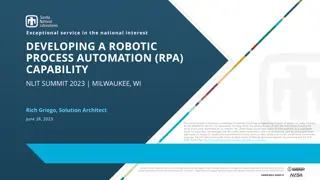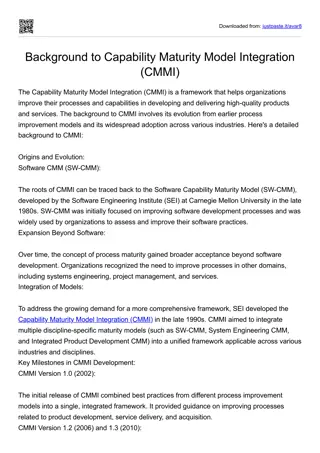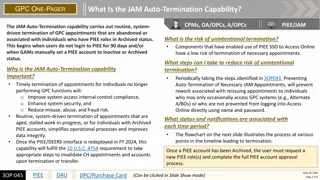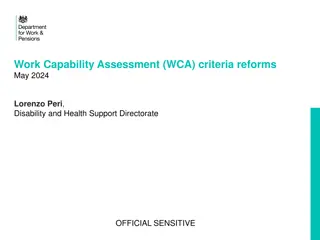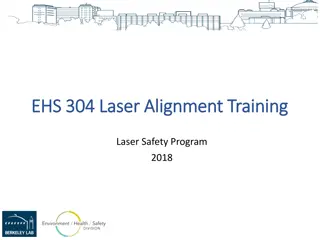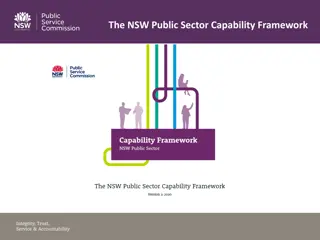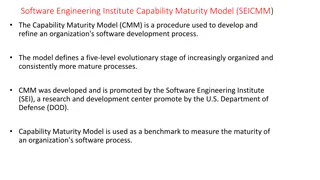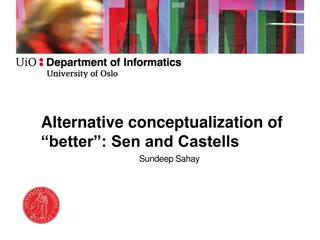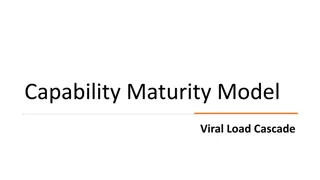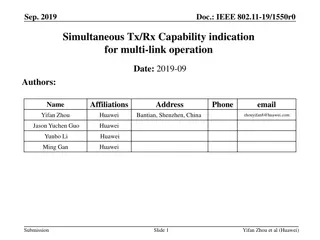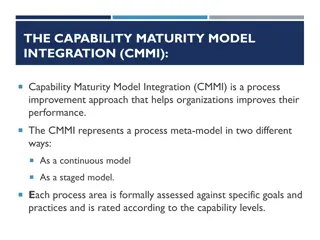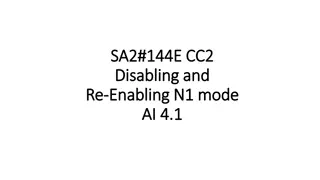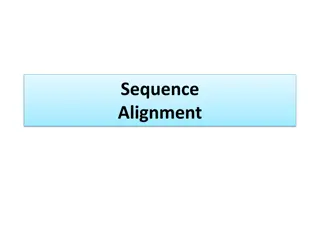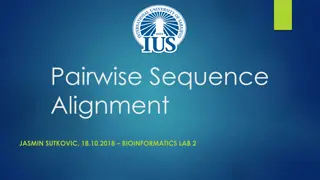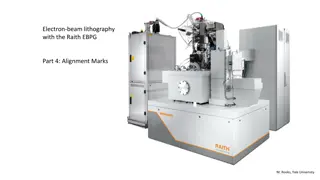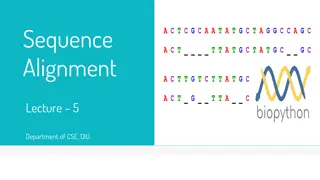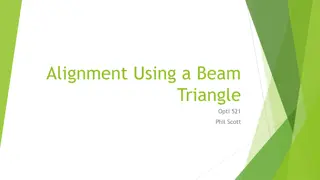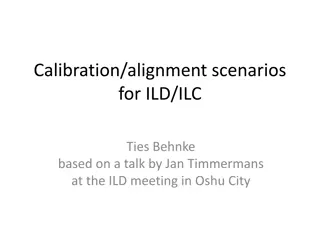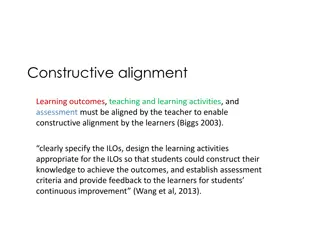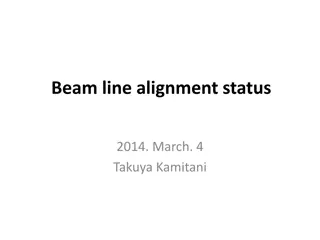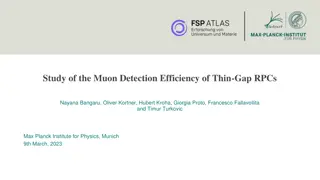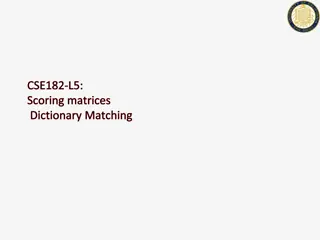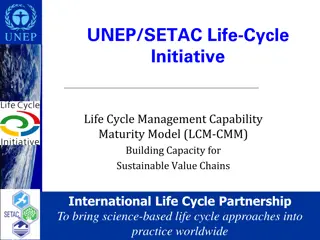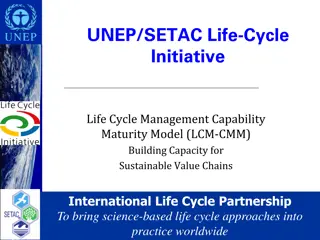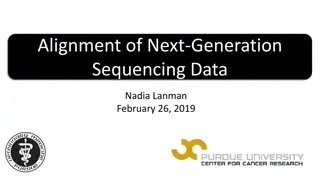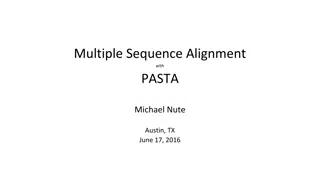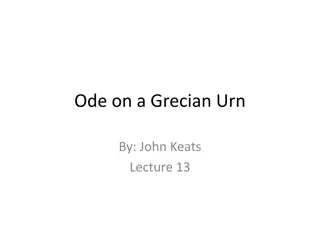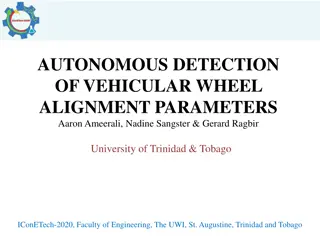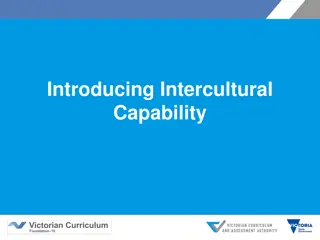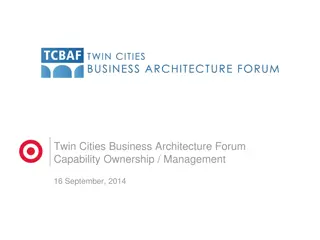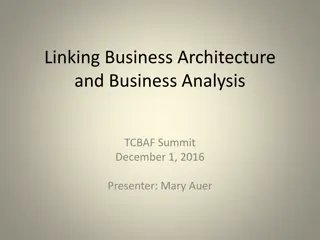NASA Navigation Sensor Technology Assessment Capability
The assessment of navigation sensor technologies for data-driven systems analysis by NASA in October 2023. Discover the motivation, method, survey, simulation model, and selected results of this capability.
0 views • 16 slides
Developing Robotic Process Automation (RPA) Capability - NLIT Summit 2023 in Milwaukee, WI
This article discusses the initiative of developing Robotic Process Automation (RPA) capability in the national interest at the NLIT Summit 2023 in Milwaukee, WI. The focus is on maximizing efficiency, agility, and effectiveness by implementing RPA to automate digital tasks, reduce manual labor, and
2 views • 20 slides
Background to Capability Maturity Model Integration (CMMI)
The Capability Maturity Model Integration (CMMI) is a framework that helps organizations improve their processes and capabilities in developing and delivering high-quality products and services. The background to CMMI involves its evolution from earlier process improvement models and its widespread
0 views • 3 slides
Radiological Emergency Preparedness Program Assessment Guidance
This module covers the assessment policies and guidance for radiological emergency preparedness programs. It includes key concepts such as metrics for program evaluation, FEMA's assurance determination process, specific demonstration requirements, capability targets, and critical tasks. Participants
4 views • 22 slides
Perfect Precision with CNC Alignment Services - Optimize Your Machines
Enhance your CNC machine performance with our expert CNC alignment services. Our skilled technicians ensure precise alignment for optimal accuracy and efficiency. We use advanced technology to correct misalignments, reducing errors and downtime. Trust us to keep your machines running smoothly. Exper
3 views • 8 slides
JAM Auto-Termination Capability in GPC Appointments
The JAM Auto-Termination capability in GPC appointments carries out routine, system-driven termination of appointments that are abandoned or associated with individuals in Archived status. This helps improve system-access internal control compliance, enhance security, and reduce fraud risk. Steps ca
0 views • 4 slides
Work Capability Assessment (WCA) Criteria Reforms May 2024
The Work Capability Assessment (WCA) determines if individuals claiming ESA and/or UC have limited capability for work (LCW) or work-related activity. Reforms aim to better support disabled individuals to engage with work. Consultation responses highlighted the need for changes in assessing disabili
0 views • 6 slides
Laser Alignment Training for Safety
This laser alignment training program focuses on exercises like wedge window alignment and beam splitter cube alignment to prevent laser eye injuries and control reflections. It covers techniques for safely setting up optics and aligning laser beams in a controlled environment.
0 views • 14 slides
NSW Public Sector Capability Framework Overview
Describes core knowledge, skills, and abilities required for all NSW public sector employees across different levels and occupational groups. The framework includes five progressive capability levels and provides a shared language for effective work performance. It integrates ethical values, non-spe
3 views • 10 slides
Understanding SEICMM - Software Engineering Institute Capability Maturity Model
The SEICMM, also known as the Capability Maturity Model (CMM), is a framework developed by the Software Engineering Institute (SEI) to enhance an organization's software development process. It consists of five maturity levels to assess and improve processes, from initial ad hoc activities to optimi
0 views • 6 slides
Rethinking Development: Perspectives on Human Capability and Well-being
Explore alternative conceptualizations of development beyond economic growth, focusing on human capability and freedom. Learn about Amartya Sen's capability approach and Manuel Castells' perspective on inclusion-exclusion in the Network Society. Discover the Human Development Index, Martha Nussbaum'
0 views • 24 slides
Personal IoT Network (PIN) Terminology Discussion for 3GPP TSG-SA WG1 Meeting
In this discussion, the concept of Personal IoT Network (PIN) and its elements are explored, including the roles of PIN Elements, Configuration PIN Capability, and Gateway Capability. The necessity of gateways to the 3GPP network, device examples, and the distinction of licensed spectrum are also ad
2 views • 10 slides
Capability Maturity Model Cascade and Viral Load Testing Stages
This content discusses the Capability Maturity Model stages, focusing on process improvement and the stages of viral load testing demand creation. It outlines the evolution from initial to optimized stages and the development towards standardized processes in organizations. Additionally, it touches
3 views • 8 slides
IEEE 802.11-19/1550r0: Simultaneous Tx/Rx Capability Indication for Multi-Link Operation
This document discusses the simultaneous Tx/Rx capability indication for multi-link operation in IEEE 802.11-19/1550r0. It covers scenarios where link selection depends on link capabilities, actions needed based on Tx/Rx capabilities, and methods to indicate simultaneous operation. The importance of
4 views • 10 slides
Understanding the Capability Maturity Model Integration (CMMI) for Process Improvement
Capability Maturity Model Integration (CMMI) is a framework that aids organizations in enhancing performance by assessing process maturity levels. It offers continuous and staged models for process improvement, with each level representing specific goals and practices. By following CMMI, organizatio
0 views • 14 slides
Interworking Considerations for N1 Mode Capability in 5G Networks
The article discusses the implications of disabling and re-enabling N1 mode capability in UE operations when transitioning between 5G and 4G networks. It explores scenarios where session continuity may be affected and proposes solutions endorsed by industry stakeholders. Key points include the alloc
0 views • 5 slides
Approach to Equity in Climate Change by Prodipto Ghosh, Ph.D.
Prodipto Ghosh's presentation delves into the terrain of equity in climate change, emphasizing obligations of parties in mitigation, adaptation, and resource transfer. The proposed equity norms highlight cooperation, capability-based resource provisions, and ensuring low-capability individuals stay
0 views • 20 slides
Fast and Accurate Short Read Alignment with Burrows-Wheeler Transform
The presentation discusses the challenges in short read alignment, introduces the Burrows-Wheeler Transform (BWT) algorithm, and compares it with other alignment algorithms. It explores exact and inexact matching approaches, presenting results and conclusions. The focus is on improving alignment spe
0 views • 63 slides
Understanding Sequence Alignment in Genetics
Sequence alignment is the comparison of DNA or protein sequences to highlight similarities, often indicating a common ancestral sequence. This process is essential in determining homology and functional similarities between sequences. Types of alignment include global and local alignment, with chall
0 views • 6 slides
Understanding Sequence Alignment and Tools in Bioinformatics
Explore the concepts of homology, orthologs, and paralogs in bioinformatics, along with different types of sequence alignment such as global, local, and semi-global. Learn about popular alignment tools like Blast and Fasta and how they are used for analyzing sequences. Dive into the world of NCBI an
0 views • 32 slides
Electron Beam Lithography with Raith EBPG: Alignment Marks Guide
The use of alignment marks in electron-beam lithography is crucial for aligning different layers of lithography, enabling precise printing of intricate patterns like wires connecting pads. This guide explores the significance of alignment marks, common alignment strategies, differences in alignment
0 views • 13 slides
Understanding Sequence Alignment Methods in Bioinformatics
Sequence alignment is crucial in bioinformatics for identifying similarities between DNA, RNA, or protein sequences. Methods like Pairwise Alignment and Multiple Sequence Alignment help in recognizing functional, structural, and evolutionary relationships among sequences. The Needleman-Wunsch algori
0 views • 18 slides
Optical Alignment Using Beam Triangle Opti 521 Phil Scott
This presentation delves into the intricate process of optical alignment using a beam triangle, focusing on defining optical and mechanical axes, addressing alignment challenges, degrees of freedom for various elements, and the importance of setting up a beam triangle for accurate alignment. The con
0 views • 14 slides
Alignment Scenarios for ILD/ILC Ties Behnke
The calibration and alignment scenarios for ILD/ILC presented at the meeting in Oshu City focus on the initial requirements for tracking, alignment precision, track-based alignment, track samples, vertex detector alignment, and Si tracker alignment techniques. The detailed specifications include lig
2 views • 9 slides
Constructive Alignment in Teaching and Learning: A Comprehensive Guide
Constructive alignment emphasizes the importance of aligning learning outcomes, teaching activities, and assessments to enhance student learning. By clearly specifying learning outcomes, designing appropriate activities, and establishing assessment criteria with feedback, educators can foster constr
0 views • 6 slides
Tasks of Alignment and Installation in CEPC Project
Tasks involved in the alignment and installation optimization of components in the Circular Electron Positron Collider (CEPC) project include control network construction, component installation, smooth alignment, and addressing any arising problems. The process is crucial for the successful operati
2 views • 19 slides
Understanding EMBOSS Needle: Pairwise Sequence Alignment Tool
EMBOSS Needle is a pairwise sequence alignment tool that uses the Needleman-Wunsch algorithm to find the optimal global alignment between two input sequences. It is available online through EMBOSS and requires entering two protein/DNA sequences of the same length to generate alignment results, inclu
0 views • 11 slides
Long-term Variation of Magnet Alignment in SPring-8 Storage Ring
This study focuses on the long-term monitoring and variation of magnet alignment in the SPring-8 storage ring. It includes detailed information on the main events of magnet alignment, monument surveys, magnet installations, and alignment monitoring techniques used over the years at the facility. The
0 views • 30 slides
Technical Review on Beam Line Alignment at KEKB Facility
Detailed overview of the alignment strategies, measurements, and completion status of girder alignment using laser straight techniques at KEKB facility. The process involves laser trackers, micrometer measurements, and monitoring floor movement to ensure precise alignment for optimal equipment perfo
2 views • 13 slides
Study of Muon Detection Efficiency in Thin-Gap RPCs
Conducted at the Max Planck Institute for Physics in Munich, this study focuses on the detection efficiency of thin-gap Resistive Plate Chambers. The research explores the construction, working principles, and experimental setup of RPCs, emphasizing the need for sensitive frontend electronics for hi
0 views • 14 slides
Understanding Sequence Alignment and Scoring Matrices
In this content, we dive into the fundamentals of sequence alignment, Opt score computation, reconstructing alignments, local alignments, affine gap costs, space-saving measures, and scoring matrices for DNA and protein sequences. We explore the Smith-Waterman algorithm (SW) for local sequence align
0 views • 26 slides
Sustainable Value Chains and Life Cycle Management Capability
The UNEP/SETAC Life-Cycle Initiative focuses on building capacity for sustainable value chains through the Life Cycle Management Capability Maturity Model (LCM-CMM). It emphasizes implementing science-based life cycle approaches globally by transitioning from events to management systems, conducting
1 views • 12 slides
Life Cycle Management for Sustainable Value Chains: Building Capacity and Promoting Innovation
This content delves into the Life Cycle Management Capability Maturity Model (LCM-CMM) aimed at enhancing sustainable value chains globally. It emphasizes the importance of bringing science-based life cycle approaches into practical implementation to address global issues, international standards, c
1 views • 11 slides
Understanding Sequence Alignment in Next-Generation Sequencing Data
Sequence alignment plays a crucial role in analyzing Next-Generation Sequencing (NGS) data by identifying similarities between DNA, RNA, or protein sequences. Global and local alignment methods are used to arrange sequences and locate fragments derived from specific genes or transcripts. Challenges
0 views • 31 slides
Understanding Multiple Sequence Alignment with PASTA Algorithm
Explore the PASTA algorithm for multiple sequence alignment, from installation to using the GUI for alignment and tree estimation. Learn about SAT and PASTA algorithms, the input process, and the steps involved in obtaining the best ML score alignment/tree pair. Dive into the PASTA GUI, initial alig
0 views • 19 slides
Exploring John Keats's Negative Capability Theory in "Ode on a Grecian Urn
John Keats, known for his melancholic temperament, delved into the concept of Negative Capability in his poetry, particularly evident in "Ode on a Grecian Urn." This theory emphasizes the poet's ability to transcend rationality and immerse in intense emotions without the need for analysis or judgmen
0 views • 29 slides
Autonomous Detection of Vehicular Wheel Alignment Parameters
This research focuses on the autonomous detection of vehicular wheel alignment parameters conducted by Aaron Ameerali, Nadine Sangster, and Gerard Ragbir at the University of Trinidad & Tobago. The study addresses the importance of wheel alignment for proper road contact and maintenance, discussing
0 views • 19 slides
Enhancing Intercultural Capability in Victorian Curriculum
Victorian Curriculum F-10, released in 2015, emphasizes intercultural capability to develop students' awareness, respect, and skills in cultural diversity. It aims to foster understanding of different cultures, challenge stereotypes, and promote acceptance for a cohesive community. The curriculum st
0 views • 5 slides
Business Capability Ownership Roles and Responsibilities at Target
Explore the journey of developing business capabilities at Target, focusing on ownership roles such as Business Capability Owner, Leader/Manager, Steward, and Stakeholder. Learn how clarity, participation, and executive involvement are essential for successful capability framework creation and utili
0 views • 7 slides
The Connection Between Business Architecture and Business Analysis
Exploring the link between business architecture and business analysis, this presentation delves into the challenges faced by business architects in keeping enablers up to date, establishing a common language, identifying stakeholders, and ensuring traceability. The objective is to facilitate inform
0 views • 17 slides

